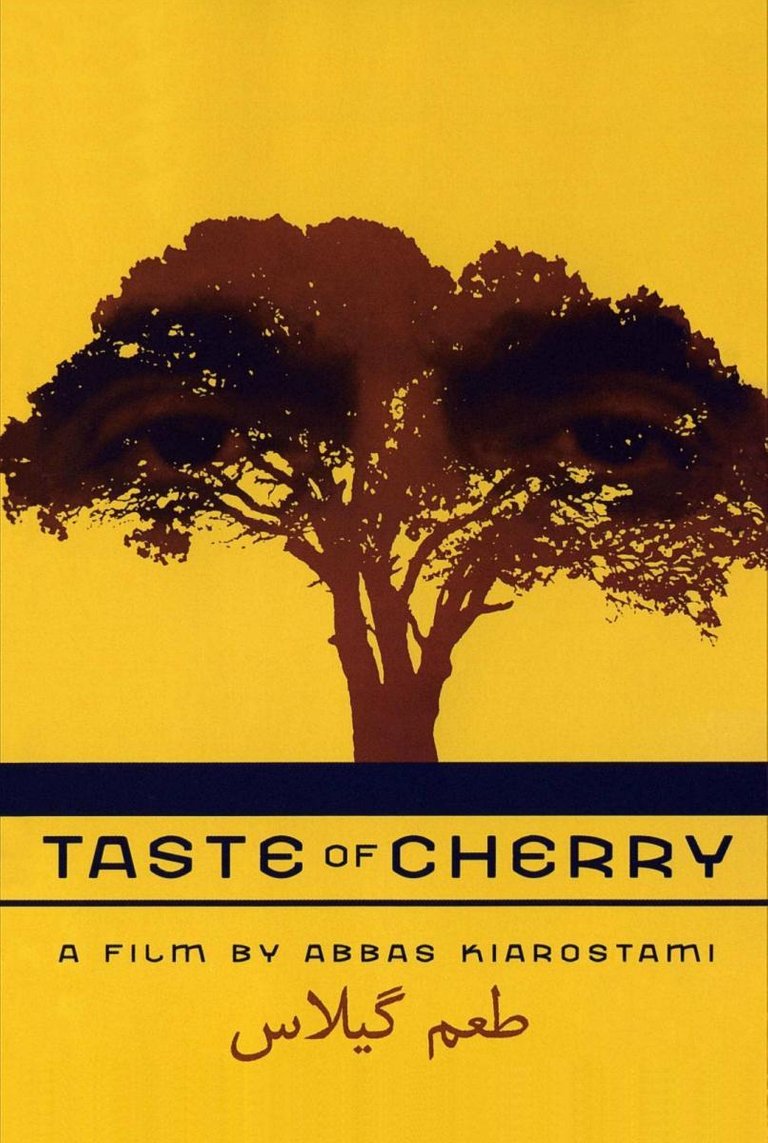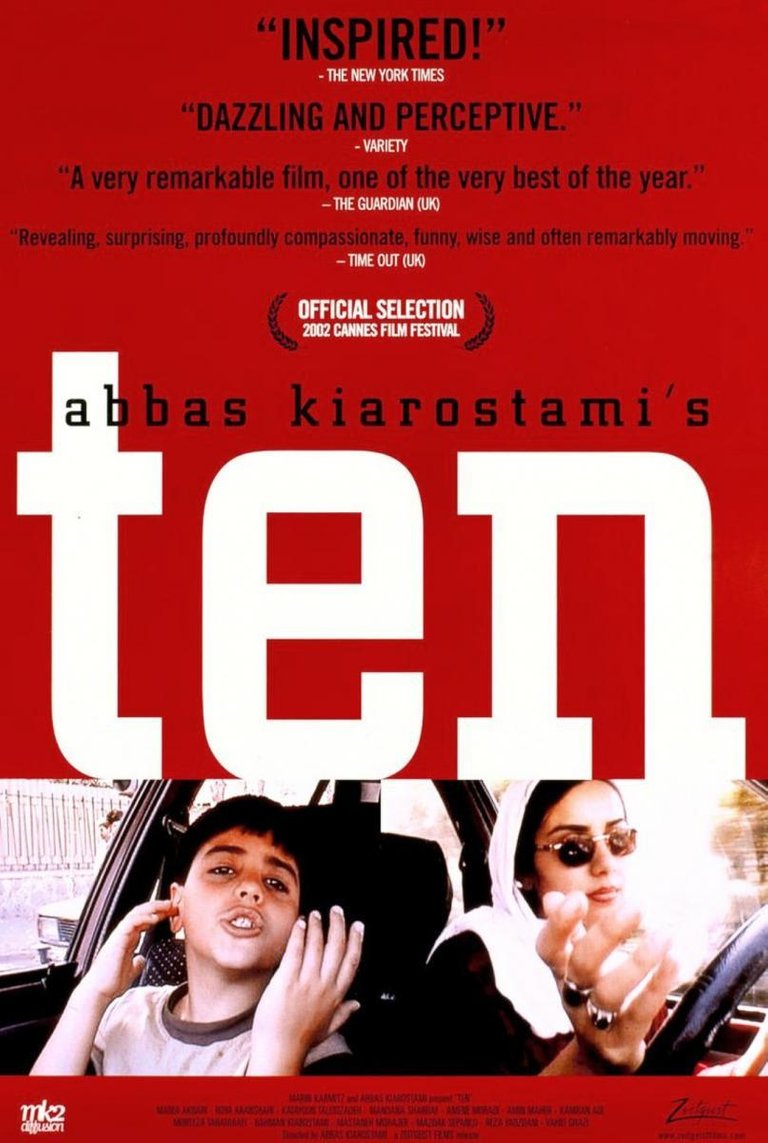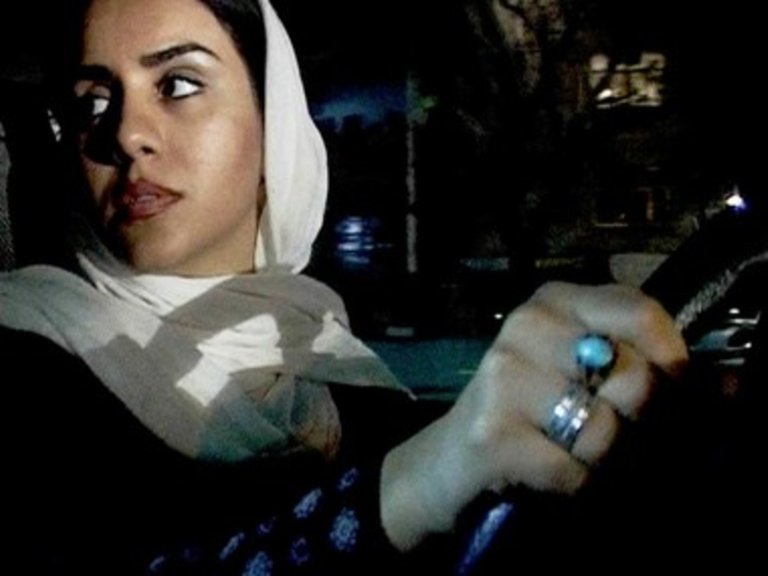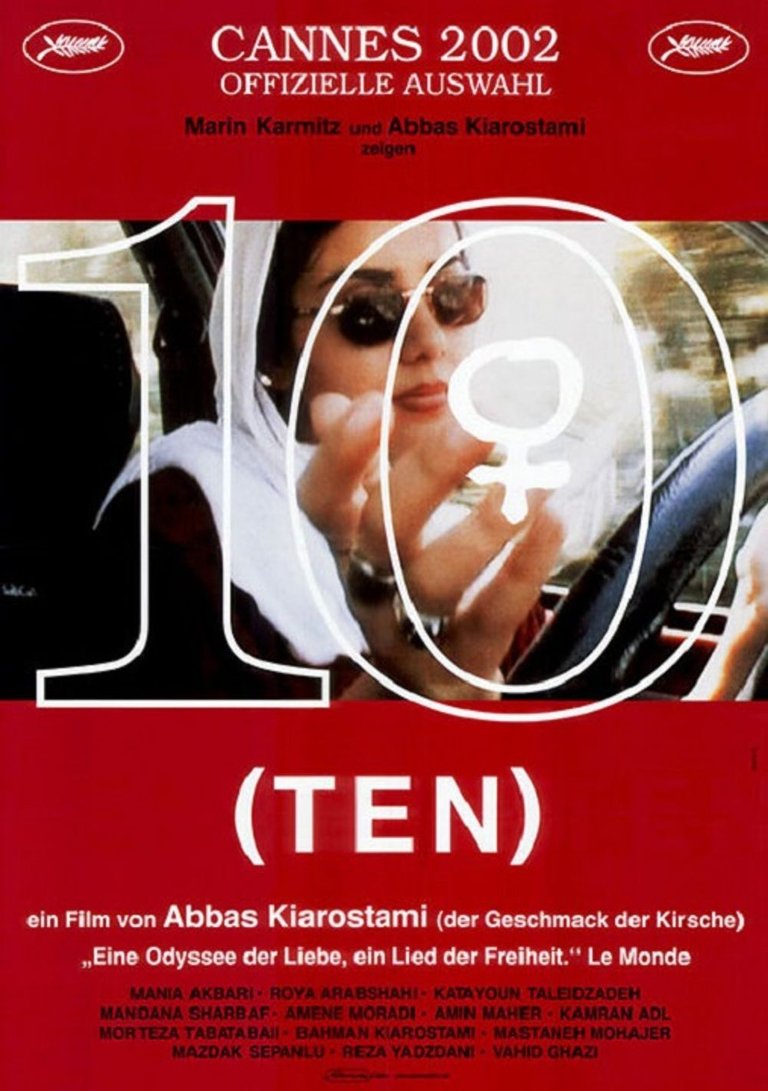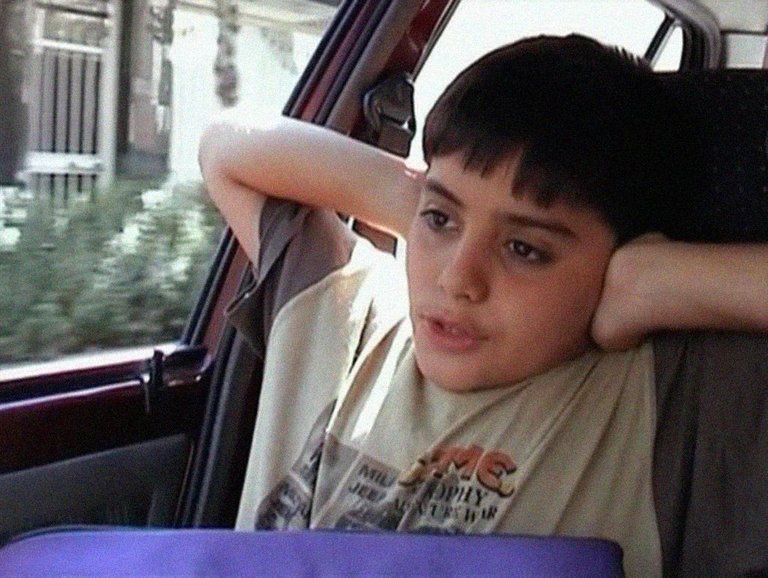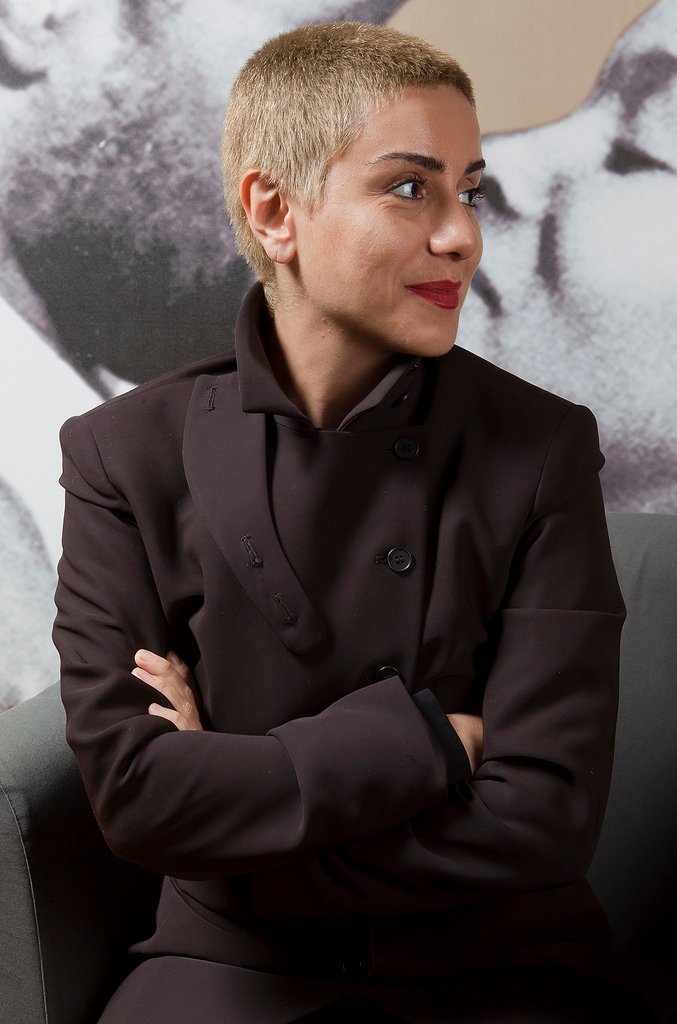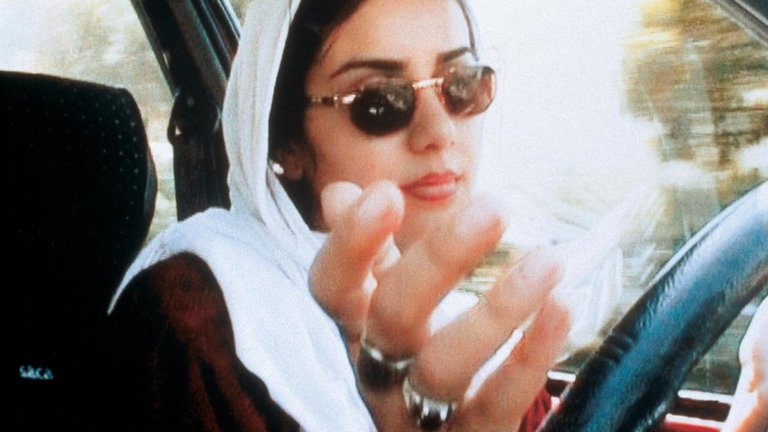
Del Director de "Taste of Cherry"
It's not frequent, but sometimes it has happened to me that after seeing a film that I really like and looking for something more from the director's filmography, I discover that I have already seen other of his works that have also left me with a pleasant feeling. It happened to me, for example, after seeing Decision to leave, when I realized that the film was directed by Chan-Wook Park, responsible for Oldboy and The Handmaiden.
No es frecuente, pero algunas veces me ha ocurrido que tras ver una película que me gusta mucho y buscar algo más de la filmografía de su director, descubro que ya he visto otros de sus trabajos que también me han dejado una sensación agradable. Me ocurrió, por ejemplo, después de ver Decision to leave, al darme cuenta que la película era dirigida por Chan-Wook Park, responsable de Oldboy y The Handmaiden.
But the most recent example occurred to me after watching the film Ten, an Iranian drama from 2002. After finishing the film, which I enjoyed very much, I started looking for previous works by its director, Abbas Kiarostami (who also wrote the script and was in charge of photography), and I discovered that not only had I seen two of them already, the tender Where's my Friend's House? and the dramatic Taste of Cherry (one of the best movies I've ever seen), but I also already had other of his films on my to-watch list: Close-Up, Certified Copy and The Wind Will Carry Us, which made me conclude that Kiarostami is definitely one of the names to keep in mind when talking about Asian cinema (yes, Iran is in Asia) and that his style is pleasing to me because he has never disappointed me. When I saw Taste of Cherry I was fascinated with the use of the camera, the central drama of the film and especially with the script, which sustains the entire film built on a man's desire to end his life. In a similar way, it's the script and the dialogues that sustain everything that happens in Ten, his 2002 film.
Pero el ejemplo más reciente me ocurrió tras ver la película Ten, un drama iraní de 2002. Al terminar el film, el cual disfruté mucho, me puse a buscar trabajos previos de su director, Abbas Kiarostami (quién además escribió el guión y estuvo a cargo de la fotografía), y descubrí no sólo que ya había visto dos de ellos, la tierna Where's my Friend's House? y la dramática Taste of Cherry (una de las mejores películas que he visto), sino que además ya tenía otras de sus películas en mi lista de pendientes: Close-Up, Certified Copy y The Wind Will Carry Us, lo que me hizo concluir que Kiarostami es definitivamente uno de los nombres a tener en cuenta al hablar del cine asiático (sí, Irán queda en Asia) y que su estilo me resulta agradable porque no me ha decepcionado en ninguna oportunidad. Cuando vi Taste of Cherry quedé fascinado con el uso de la cámara, el drama central de la película y sobre todo con el guión, el cual sostiene toda la película erigida sobre el deseo de un hombre de acabar con su vida. De una maner similar, es el guión y los diálogos son lo que sostiene todo lo que ocurre en Ten, su película del año 2002.
Briefly, the film shows a woman, whose name is never revealed (played by Mania Akbari), who drives a car. Throughout just over ninety minutes we see ten encounters that she has with different people, all inside her vehicle and all with her behind the wheel.
En pocas palabras la película muestra a una mujer, cuyo nombre nunca es revelado (interpetada por Mania Akbari), que conduce un automóvil. A lo largo de poco más de noventa minutos vemos diez encuentros que ella tiene con diferentes personas, todos dentro de su vehículo y todos con ella al volante.
The passengers that she takes from one place to another are her son Amin (who in real life is the son of Mania Akbari herself), her sister, a girlfriend whose relationship with the potagonist is not clear, an older woman who is going to pray and a sex worker. The ten encounters that make up the ten scenes of the film are preceded by a countdown, that is, before the first scene a number 10 appears, then before the second scene a 9 appears and so on, but although this fact seems to suggest that the meetings go in an inverse temporal order, the truth is that through the conversations we witness we realize that this is not the case (for example, the driver takes a woman twice and in the second meeting she does reference to the previous conversation). By now some of you may be thinking that if everything happens in the car the ten encounters must be monotonous, repetitive and boring, but if that were the case I would not have taken the time to write this review and recommend this movie.
Los pasajeros que ella lleva de un lado a otro son su hijo Amin (quien en la vida real es el hijo de la propia Mania Akbari), su hermana, una novia cuya relación con la potagonista no es claara, una mujer mayor que va a rezar y una trabajadora sexual. Los diez encuentros que constituyen las diez escenas de la película son precedidos por una cueta regresiva, es decir, antes de la primera escena aparece un número 10, luego antes de la segunda escena aparece un 9 y así sucesivamente, pero aunque ese hecho pareciera sugerir que los encuentros van en un orden temporal inverso, la verdad es que a través de las conversaciones de las cuales somos testigos nos damos cuenta de que no es así (por ejemplo, la conductora lleva a una mujer dos veces y en el segundo encuentro hace referencia a la conversación previa). A estas alturas algunos de ustedes deben estar pensando que si todo ocurre a bordo del automóvil los diez encuentros deben ser monótonos, repetitivos y aburridos, pero si ese fuera el caso no me habría tomado el tiempo de escribir esta reseña y recomendar esta película.
Because the truth is that the film has a great rhythm and an incredible script through which we reflect on issues of great importance such as motherhood, divorce, misogyny, marriage, faith, happiness, life and death, the search for self-realization, patriarchy and many others. Meetings inside the car almost become conferences, deep conversations clothed in everyday normality.
Porque la verdad es que la cinta tiene un gran ritmo y un guión increíble a través del cual reflexionamos sobre temas de gran importancia como la maternidad, el divorcio, la misoginia, el matrimonio, la fe, la felicidad, la vida y la muerte, la búsqueda de la autorrealización, el patriarcado y muchos otros. Los encuentros dentro del automóvil se convierten casi en conferencias, en conversaciones profundas revestidas de cotidiana normalidad.
One of the things I really liked was the fact that the camera doesn't always land on all the characters. For example, in the first scene we see the protagonist's son, but we only listen to her; the driver does not appear on camera until the boy, Amin, gets out of the car. Contrary to what happens with the older woman who goes to the mausoleum and with the sex worker, whom we only listen to, but do not see because the camera always focuses on the driver and her reactions. Only in subsequent meetings with her son, one with her sister and the other with the woman who wishes to marry, does the camera alternate between the two passengers. This dynamic, despite being very simple and despite not abandoning the tiny setting that represents the interior of a vehicle, manages to give the story a great narrative rhythm and allows us to discover the life and personality of the protagonist: she's a divorced woman who has a new partner and who works a lot, not in housework, but in a job related to photography. Being a devoted wife, cooking dinner and taking care of the house was not what she wanted for her life and that's why she separated from Amin's father to pursue her self-fulfilment and happiness, even if for this she had to lose custody of her son and have to lie in their statements in order to obtain a divorce, something that her son still claims.
Una de las cosas que me gustó mucho fue el hecho de que la cámara no siempre se posa en todos los personajes. Por ejemplo, en la primera escena vemos al hijo de la protagonista, pero a ella solamente la escuchamos; la conductora no aparece en cámara hasta que el niño, Amin, se baja del auto. Caso contrario a lo que ocurre con la mujer mayor que va al mausoleo y con la trabajadora sexual, a quienes únicamente escuchamos, pero no vemos porque la cámara se enfoca siempre en la conductora y en sus reacciones. Solamente en los encuentros posteriores con su hijo, uno con su hermana y el otro con la mujer que desea casarse, la cámara se va alternando entre ambos pasajeros. Esta dinámica, pese a ser muy sencilla y pese a no abandonar el minúsculo escenario que representa el interior de un vehículo logra imprimirle un gran ritmo narrativo a la historia y nos permite ir descubriendo la vida y la personalidad de la protagonista: es una mujer divorciada, que tiene una nueva pareja y que trabaja mucho, no en labores hogareñas, sino en un trabajo relacionado con la fotografía. Ser una esposa abnegada, hacer la cena y cuidar la casa no era lo que quería para su vida y por eso se separó del padre de Amin para perseguir su autorrealización y su felicidad, aunque para ello tuviera que perder la custodia de su hijo y tuviera que mentir en sus declaraciones para poder obtener el divorcio, cosa que su hijo aún le reclama.
Yes, throughout the different conversations we find out about these things and many more if we know how to pay attention. A phrase here, a gesture there, help us build the profile of each of the characters and invite us to reflect on valuable issues. Once again Kiarostami gives a lecture on minimalism and the use of resources in a memorable film that was included among Empire magazine's 500 Best Films of All Time, among the best films of the decade 2000-2009 according to the BBC and among the best one hundred films of the 21st century according to a ranking published by The Guardian in 2019. In other words, it's a film that must be seen. Despite the fact that the premise may seem boring and monotonous, the invitation is for you to approach Ten (available on Mubi) with an open mind and attentive senses (especially your ears) and discover that with a small budget and a good script can tell a great story. Have any of you seen this film or any other by Abbas Kiarostami? What is your favorite? I read them in the comments.
Sí, a lo largo de las diferentes conversaciones nos vamos enterando de esas cosas y muchas más si sabemos prestar atención. Una frase aquí, un gesto allá, nos ayudan a construir el perfil de cada uno de los personajes y nos invitan a reflexionar sobre temas valiosos. Una vez más Kiarostami da una cátedra de minimalismo y aprovechamiento de recursos en una película memorable que fue incluida entre las Mejores 500 películas de la historia de la revista Empire, entre las mejores películas de la década 2000-2009 según la BBC y entre las mejores cien películas del siglo XXI según un ranking publicado por The Guardian en 2019. Es decir, es una película que debe verse. A pesar de que la premisa pueda parecer aburrida y monótona, la invitación es a que se acerquen a Ten (disponible en Mubi) con la mente abierta y los sentidos atentos (en especial el oído) y descubran que con poco presupuesto y un buen guión se puede contar una gran historia, ¿alguno de ustedes ha visto esta película o alguna otra de Abbas Kiarostami? ¿cuál es su favorita? Los leo en los comentarios.
Reviewed by | Reseñado por @cristiancaicedo
Other posts that may interest you | Otros posts que pueden interesarte:
 |
|---|
